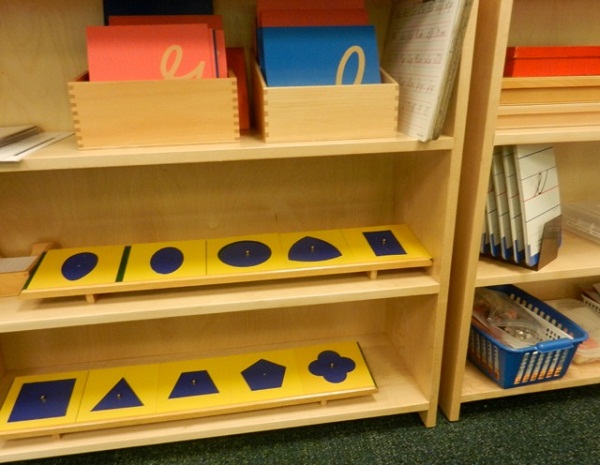
Photo from Beauty of Everyday Life. /Sandpaper letters and metal inserts.
It was a simple query put out on Facebook and Twitter by blogger Louisa Claire Have any of you sent your children to a Montessori Preschool? What can you tell me about it??
Suddenly, I was transported back some fourteen years to when I was a young mum desperately trying to make my mind up about the best option for my children. While I may have been (still am) a little obsessive about my children’s education I remember clearly the stress of trying to find something we could afford but aligned with my personal values and providing a safe and happy place for my babies.
A couple of people had responded negatively to Louisa’s request with their concerns over Montessori’s suitability. I submitted my own response trying hard not to sound like some mad zealot attempting to convert all comers to my personal cult. But it was a struggle. I was pleased when others who had experienced Montessori as teachers and parents put forward some positive thoughts on Montessori schools.
As my girls are now 16 and 13 we’ve pretty much done the lot when it comes to education. They have been in mainstream daycare, attended a Montessori kindy, gone to a public primary school (and not some fancy schmanzy public school in a middle-class suburb but a rundown public school in a low socio-economic area), then finished up in the private system (albeit the lower end of the private system in a regional Catholic school).
At the end of the day, after trying all of the options, the Montessori philosophy most closely aligns with my personal beliefs on how a school should educate a child. It stands out as the system that best suited my children and if I’m honest I still miss it.
My decision to put my girls in a Montessori kindy, came down to two pivotal moments. The first occurred while sitting in a full lecture hall on day one of my Bachelor of Education degree. The lecturer informed us our first focus would be on learning to teach students to read. Given I was in a Secondary Education Teaching degree I was shocked to hear “there will be students in your classes that can’t read, on any given day your student’s abilities will start from special needs and go up to gifted and talented, you will need to cater for that entire range”. For the life of me I couldn’t see how that was going to be possible. Two years later I walked into a Montessori kindy and figured out the “how” in catering to range of learning levels and styles.
The second “aha” moment in my moving to a Montessori education for my daughters was sitting in that kindy and watching the teacher demonstrate how to use the mathematics equipment. I turned to my husband and said “I think I would have understood maths if I had have been taught this way”.
The girls attended the one Montessori kindy for three days a week from two-and-a-half until six years of age.
This was our reality when it came to some of the criticisms of the Montessori approach.
The kids can do whatever they want, it has no structure.
In fact the curriculum includes grace and courtesy lessons, good behaviour is expected and reinforced. Our kindy had a specialist behaviour management expert work with staff to design a set of classroom “rules”. These were hands are for helping, careful moving, friendly listen, p’s t’s and e’s (please, thank you and eye contact).
The children could select whichever activity they wanted from the shelves but it wasn’t a “do anything you like” free-for-all. If children weren’t selecting anything the teacher would guide and direct until a suitable activity was undertaken. In fact it was highly structured with each activity building up to another. A lot of time and effort went into preparing the environment so that everything on offer had an educational purpose.
It is too structured there are no opportunities for play.
You won’t find a home corner or a dress-up box in a Montessori kindergartens. My girls never missed them. There was plenty of opportunities for dressing up at home and the practical life area gave them the chance to use real equipment in real scenarios which they loved. Grating, chopping, pouring, cleaning they felt very important as they mastered each task. There was a lot of play taking place in our kindy, in the sandpit, on the monkey bars and in the playground. The girls were both very happy.
Montessori inhibits creativity.
If that was the case Hippie Child was a real trial for them. The kid lived in a complete fantasy land for almost two years. At our kindy they were exposed to colour tablet activities, art appreciation tasks and a specialised music program. Both girls emerged with a love of music and a passion for drawing.
In testing out Montessori we delivered to them two very different children. Hippie Child the lack-of-focus dreamer, and Princess Child the anxious toddler with an attention span shorter than some children diagnosed with ADHD. They guided and adapted for the Hippie one and encouraged her to focus. They calmed the Princess and she blossomed in a structured, ordered environment.
I found the classroom to be a peaceful place (most of the time), with children given time to engage in activities. I think there were higher expectations for the children in the Montessori curriculum but they were given a lot of individual attention and support and their achievements flowed naturally as opposed to being “hot housed”.
In the end though two of the most important elements the girls took from Montessori were empathy and self-reliance. In the three-year-cycle the children remain in the same classroom growing from being the “babies” of the class to the “big kids” they were taught that as an older child you must look out for the little ones. They learnt about different cultures and were taught to respect others. They were continually given opportunities to be independent and self-directed and shown strategies for dealing with difficult situations, they left confident and outgoing.
In the end every education system has benefits and negatives. Passionate teachers can overcome limited resources and inspire children to achieve. A load of fancy equipment can’t compensate for disinterested educators. As parents we take our leap of faith and hand our children over to others, sometimes it will see them thrive, sometimes it will see them struggle. We adapt and modify as need be.

Photo by Beauty of Everyday Life. Maths beads.





My kids did Montessori when we were living in New York. It didn’t really suit my arty eldest, who only really started to thrive when she got into the public school system in Australia. But I have friends whose son is 9 and still attending Montessori and they LOVE it. To each their own.
I guess it’s how the program is implemented and the connection the child makes with the teachers. My eldest was very arty as well, and she in her own quiet way rebelled sometimes against the structure, as a five year old she hated the language lessons and kept heading back to the practical life area (with the three-year-olds). However, she did like the maths activities, so the teachers focused on those for a while. They did do painting and drawing which she loved and the specialised music program which she thought was fantastic. It is sometimes a matter of trial-and-error with our kids though isn’t it? I’m glad your daughter found her place in the public system.
without realizing it, I was a Montessori mum. A friend of my even did her Masters Degree on the Montessori method and said that in her final days, Mari said it was best if a young child could stay with his mother.
It does seem to be a very practical system, so many facets of it can be implemented at home. I think my kids benefited from the interaction with other children and the equipment at the kindy, which I wouldn’t have been able to replicate at home.
I found this post so interesting, Janine. I loved reading about your positive experience with the Montessori system. I’d not really heard much about it, so I learned a little today.
I agree with you that a passionate teacher makes all the difference. We have been fortunate to have had the same wonderful teacher for three years (Prep for my oldest and Prep and Year 1 for my youngest). Now that we no longer have her, I see how lucky we really were. Actually I always knew.
Glad you enjoyed it. I think a great teacher can be the difference in any system of education. I’m only now just seeing how big an impact some of Hippie Child’s early teachers (particularly in Primary school) have impacted on what she does now, eg deciding to study Ancient History because of a unit of work on Ancient Rome in Year 4 presented by an enthusiastic teacher.
I really enjoyed this article! Thank you. 🙂
Glad you enjoyed it. Thank you for stopping by.
Janine! WoW, thank you so much for writing this. It has been SO helpful! I really appreciate the thought that has gone into this and it does help me think about what will be best when it comes to Bear next year. Looking forward to reading your other posts . xx
Pleasure Louisa. I keep thinking of things to add in but I don’t want to come across too obsessive compulsive on this subject! Some other points that were benefits for me in the kindy were the number of staff/pupil ratio. It was quite high. When Hippie Child started there her speech was very delayed from constant ear infections. She was basically unintelligible. But staff worked with her quite closely (when she was assessed by a speech pathologist they said she was speaking with an asian accent – the assistant teacher who worked with her was asian). The set up of the room and the activities allow teachers to work individually with children and cater for differences.
“in the end the two most important elements my girls took from montessori were empathy and self-reliance.” wonderful! that sense of caring for others while also knowing you are in charge of yourself are important things for little ones to learn early.
today we had a lesson on giving compliments as well as math, language, and science. children need grace and courtesy lessons. as a montessori 6-9 year old teacher, i see many benefits. but i agree with you, janine, one method is not for everyone. parents know their children best. thanks for a thoughtful message.
I love that you did a lesson on giving compliments alongside math, language and science. Thanks for your thoughts.